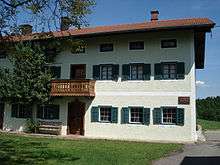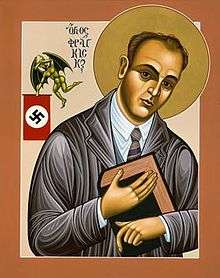Franz Jägerstätter
| Blessed Franz Jägerstätter, O.F.S. | |
|---|---|
|
Franz Jaegerstaetter | |
| Martyr | |
| Born |
Franz Huber 20 May 1907 Sankt Radegund, Upper Austria, Austria-Hungary |
| Died |
9 August 1943 (aged 36) Brandenburg an der Havel, Province of Brandenburg, Nazi Germany |
| Honored in | Secular Franciscan Order |
| Beatified | 26 October 2007, Linz, Austria by Pope Benedict XVI |
| Feast | 21 May |
| Patronage | Conscientious objectors |
Franz Jägerstätter, O.F.S., (also spelled Jaegerstaetter in English) (20 May 1907 – 9 August 1943) (born as Franz Huber) was an Austrian conscientious objector during World War II. Jägerstätter was sentenced to death and executed. He was later declared a martyr and beatified by the Catholic Church.
Life

Jägerstätter was born in Sankt Radegund, Upper Austria, a small village between Salzburg and Braunau am Inn. He was the illegitimate child of Rosalia Huber, a chambermaid, and Franz Bachmeier, a farmer.[1] As his parents could not afford a marriage, Franz was first cared for by his grandmother, Elisabeth Huber. His natural father was killed in World War I when he was still a child, and when his mother married in 1917, Franz was adopted by her husband, Heinrich Jägerstätter.
In his youth, Franz gained a reputation for being a wild fellow, but, in general, his daily life was like that of most Austrian peasants. He worked as a farmhand and also as a miner in Eisenerz, until in 1933 he inherited the farmstead of his foster father. In that same year, he fathered an out-of-wedlock daughter, Hildegard Auer.[2] On Maundy Thursday of 1936, he married Franziska Schwaninger (1913–2013), a deeply religious woman. After the ceremony, the bridal couple proceeded on a pilgrimage to Rome. Inspired by his wife, Jägerstetter began to study the bible and the life of saints. The marriage produced three daughters.
When German troops moved into Austria in March 1938, Jägerstätter rejected the offered position as Radegund mayor. He was the only person in the village to vote against the Anschluss in the plebiscite of 10 April; nevertheless, the local authorities suppressed his dissent and announced unanimous approval. Although he was not involved with any political organization and did undergo one brief period of military training, he remained openly anti-Nazi. On 8 December 1940, he joined the Third Order of Saint Francis and from summer 1941 worked as a sacristan at the local parish church, being deferred from military service four times.
Drafted for the first time on 17 June 1940, Jägerstetter, aged 33, was again conscripted into the German Wehrmacht armed forces in October and completed his training at the Enns garrison. He had to take the Hitler oath, but could return home in 1941 under an exemption as a farmer. Faced with his experiences in military service, the suppression of the church, as well as reports on the Nazi T4 "euthanasia" program, he began to examine the morality of the war. He even proceeded to Linz to discuss this with his bishop but emerged from the conversation saddened that the episcopate seemed afraid to confront the issues.[1][3]
Arrest and death

After many delays, Jägerstätter was finally called to active duty on 23 February 1943. By this time, he had three daughters with his wife, the eldest not quite six. He maintained his position against fighting for Nazi Germany and upon entering into the Wehrmacht garrison in Enns on March 1 declared his conscientious objection. His offer to serve as a paramedic was ignored.[4] He was immediately arrested and placed in custody, first at the Linz remand prison, then from 4 May at Berlin-Tegel. A priest from his village visited him in jail and tried to talk him into serving, but did not succeed. When he heard of the faith of the Austrian priest Franz Reinisch, who had been executed for his refusal to take the Hitler oath, he was determined to go the same way.
Accused of Wehrkraftzersetzung (undermining of military morale), Jägerstätter was sentenced to death in a military trial at the Reichskriegsgericht in Berlin-Charlottenburg on 6 July 1943. He was deported to Brandenburg-Görden Prison on 9 August, where he was executed by guillotine in the afternoon, aged 36. After the war, in 1946, his ashes were buried at the Sankt Radegund cemetery.

Legacy and beatification
Jägerstätter was criticized by his countrymen, especially by those who had served in the military, for failing in his duty as a husband and father. The municipality of Sankt Radegund at first refused to put his name on the local war memorial and a pension for his widow was not approved until 1950.
Jägerstätter's fate was not well known until 1964, when US sociologist Gordon Zahn published his biography, In Solitary Witness. Thomas Merton, the famed Trappist monk and peace activist, included a chapter about Franz Jägerstätter in his book Faith and Violence (1968). A 1971 film treatment of his life made for Austrian television, Verweigerung ("The Refusal") (originally titled Der Fall Jägerstätter), by director Axel Corti starred Kurt Weinzierl. His case was a topic of the annual Braunauer Zeitgeschichte-Tage conference in 1995. The death sentence was nullified by the Landgericht Berlin on 7 May 1997. A Stolperstein for Jägerstätter in Sankt Radegund was laid in 2006.[5]
In June 2007, Pope Benedict XVI issued an apostolic exhortation declaring Jägerstätter a martyr. On 26 October 2007, he was beatified in a ceremony held by Cardinal José Saraiva Martins at the New Cathedral in Linz.[6] His feast day is the day of his christening, 21 May.
A movie, Radegund, written and directed by Terrence Malick, is scheduled for a 2018 release.[7]
Bibliography
- Zahn, Gordon (1964). In Solitary Witness. The life and death of Franz Jägerstätter. Springfield, Illinois: Templegate Publishers. ISBN 0-87243-141-X.
- Andreas Maislinger, Franz Jägerstätter. In: Conquering the Past. Austrian Nazism Yesterday & Today. Edited by Fred Parkinson. Wayne State University Press, Detroit 1989.
- Andreas Maislinger, Franz Jägerstätter and Leopold Engleitner. In: Bernhard Rammerstorfer, Unbroken Will. The Extraordinary Courage of an Ordinary Man. The Story of Leopold Engleitner. Grammaton Press. New Orleans 2004. ISBN 0-9679366-4-0
- Jägerstätter, Franz (2009). Putz, Erna, ed. Franz Jägerstätter: Letters and Writings from Prison. translator:Robert Anthony Krieg. Maryknoll, New York: Orbis Books. ISBN 978-1-57075-826-3. OCLC 295046320.
References
- 1 2 Peter Popham (26 October 2007). "Austrian farmer executed for defying Nazis on path to sainthood". The Independent.
- ↑ Biography of Jägerstätter Archived 23 August 2009 at the Wayback Machine. (in German)
- ↑ "Franz Jägerstätter 1907 – 1943 - Martyr" Archived 15 September 2014 at the Wayback Machine.
- ↑ "Bl. Franz Jägerstätter (1907-1943) - Biography". Retrieved 8 October 2016.
- ↑ "Stolperstein erinnert an Wehrdienstverweigerer Franz Jägerstätter" (in German). Evangelischer Presseverband für Bayern. 7 August 2006. Archived from the original on 18 July 2011. Retrieved 7 March 2011.
- ↑ "Franz Jägerstätter- Against the Stream" (PDF). ¡Presente!. Vol. 13 no. Spring. 2008. p. 3.
- ↑ Becklo, Matthew (February 17, 2017). "New film to tell Nazi-era love story of martyr and his wife". Aleteia.org. Retrieved February 20, 2017.